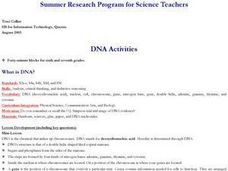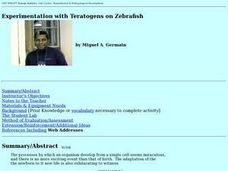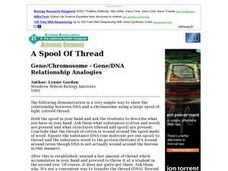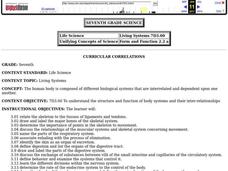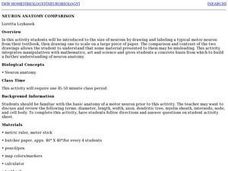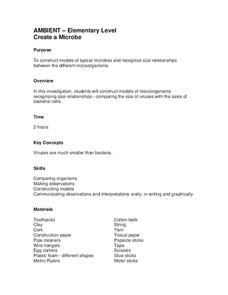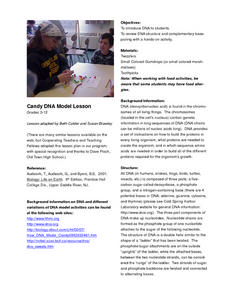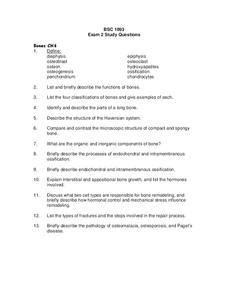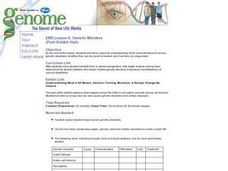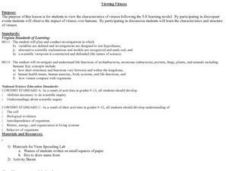Curated OER
Edible DNA
Students use multicolored soft candies (gumdrops and candy orange slices) and toothpicks to create models of DNA structures. They discuss the fact that DNA must copy itself before splitting into two cells. Students demonstrate this by...
Curated OER
Nervous Tissue
In this nervous tissue worksheet, students list and describe the functions of the nervous system and its two principle parts. Then they list and give the function and location of the six types of glial cells. Students also describe two...
Curated OER
DNA Activities
Students work together to identify the structure of DNA. They practice using new vocabulary as well. They create a 3-D model of DNA to complete the instructional activity.
Curated OER
Experimentation with Teratogens on Zebrafish
Students compare mitosis and meiosis with regard to chromosome number in parent cells versus daughter cells, types of cells produced, total number of cells produced, and the number of divisions. In groups, identify and differentiate the...
Curated OER
Meiosis, Gene Linkage and Maps
Young scholars identify the structures that actually assort independently. They are taught how gene maps are produced. Students compare the processes of mitosis and meiosis. They are shown their (mitosis and meiosis) significane to...
Curated OER
Anatomy and Physiology Study Questions on Immunology
In this anatomy and physiology study question worksheet, students define 20 terms related to the immune system. They answer 19 short answer questions that deal with immunology, autoimmune diseases, and the components and cells related to...
Curated OER
A Spool Of Thread
Students describe a spool of light colored thread that the teacher holds in his/her hands. They are asked what substances (cotton and wood) are present and what structures (thread and spool) are present. The teacher conclude that the...
Curated OER
Integumentary System
In this integumentary system worksheet, 9th graders list the two major layers of the skin and name the type of tissue composing each layer. Then they describe the structure and function of the hypodermis. Students also list three types...
Curated OER
Human Body Systems
Seventh graders investigate the structure and function of body systems and their inter-relationships. They draw and label the major body systems, observe demonstrations of various body systems, define key vocabulary terms, and compare...
Curated OER
The Life Of Bees
Students explore the matriarchal structure of a bee colony. They participate in various activities to identify the structure of a bee colony and the roles of each type of bee plays in the colony. Vocabulary and a worksheet with answer...
Curated OER
DNA and Genes
Students analyze the structure of DNA. They describe how the structure of DNA enables it to reproduce itself accurately. Students discuss genes and the sequence of nucleotides occur in DNA.
Curated OER
Neuron Anatomy Comparison
Students create a scale model of a motor neuron that is two hundred times larger than the actual neuron. They identify the structures of a neuron and observe neurons under the microscope then use a worksheet to convert actual sizes into...
Curated OER
Create a microbe
Students explore viruses and bacteria. They construct three dimensional models of microorganisms recognizing size relationships by comparing the size of viruses with the sizes of bacterial cells.
Curated OER
Endocrine System Study Question Worksheet
In this endocrine system worksheet, students define 8 words associated with this human system. They answer 11 short answer questions about the structure and function of the organs and hormones that make up the endocrine system.
Curated OER
Candy DNA Model Lesson
Young scholars explore DNA structure using materials such as Twizzlers, small colored gumdrops and/or toothpicks.
Curated OER
Hierarchical Organization in Biology: Students Presentations of Neurobiology
Students gather (research) information on neuron structure and action potential. Students are guided to make inferences about the synapse and its relationship to neurotransmitter release and action. They are also guided to make...
Curated OER
Bones
In this bones worksheet, students list and describe the functions of bones and give examples for each. Then they compare and contrast the microscopic structure of compact and spongy bone. Students also list the types of fractures and the...
Curated OER
Creepy Critters
Students develop a classification scheme based on the structural features of organisms. In this organism lesson students divide into teams and complete a fun activity.
Curated OER
Colored Shadows
Learners explore how different colors are seen through the cone cells in our eyes. In this light lesson students complete a lab activity with light and record their observations.
Curated OER
Genetic Mistakes
Learners explore genetic disorders. They examine the genetic structure to physicial manifestations of various disabilities. Using internet sources, students analyze the characteristics of genetic disorders, whether they can be cured or...
Curated OER
Viewing Viruses
Pupils view the characteristics of viruses following the 5-E learning model. By participating in discrepant events Students observe the impact of viruses over humans. By participating in discussion pupils examine the characteristics and...
Curated OER
Using VNTR Analysis to Identify Guilt at a Crime Scene
Students collect DNA from cheek cells. They compare and contrast the processes of DNA replication and PCR. They discuss how this information can be used to determine guilt at crime scenes.
Curated OER
Breaking It Down
Seventh graders explain the mechanism of digestion. In this biology lesson, 7th graders perform an iodine test to check for the presence of starch. They discuss how energy travels through the food chain.
Curated OER
Water and Ice
Students will observe, measure and describe the phase changes of ice. In this science lesson plan, students observe ice as it changes phases. Qualaitative notations made by individual students will be shared and compared.
Other popular searches
- Plant Cell Biology
- Inquiry Based Cell Biology
- Cell Biology Mitosis
- Cell Structure Powerpoint
- Cell Biology Meiosis
- Cell Structure and Function
- Cell Biology Vocabulary
- Label Cell Parts
- Grade 11 Cell Biology
- Cell Parts Pictures
- Cell Biology Activities
- Human Cell Biology


